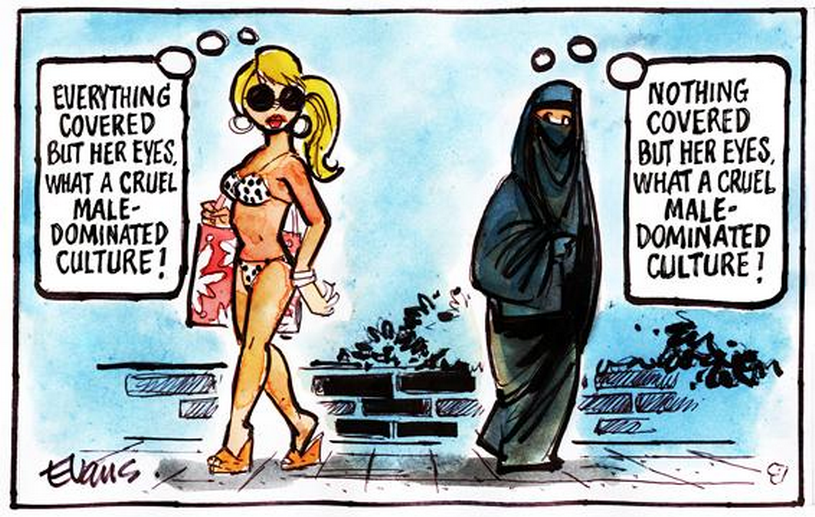

 By VennerRoad, 30th Nov 2015
By VennerRoad, 30th Nov 2015
Debunking the nonsense that religious or national dress codes are a form of patriarchal oppression.

One of the most facile claims made by radical feminists about the alleged Islamic oppression of women is that in some countries, Iran for example, a woman must cover her hair in public. The cartoon attached to this dissertation shows another side to that. Feminists are not fans of Revisionist History when it relates to the Second World War, but their own revisionism is not based on a reappraisal of documents and testimonies, they simply tear up the history books and write their own. Had they adopted a scientific approach they would never have endorsed the nonsense of patriarchy theory, but let’s stick with dress codes.
We are all born naked, and our distant ancestors walked about naked. At some point they began wearing clothes, and it appears that footwear aside (a practical measure) the first part of the anatomy they covered was their genitalia, men and women.
Some of our not so distant ancestors were totally uninhibited about the human body. The original Olympic Games were performed by competitors wearing loin cloths, then they reverted to total nudity. That would be a spectacle today!
At some point in history, women covered their breasts, although even today there are some African countries where it is not only socially acceptable but normal for women to walk around bare-breasted, although that will probably change drastically as the continent is industrialised.
Dress codes vary drastically the world over, and sometimes over relatively short geographical distances. In the UK, a man may take off his shirt and walk down the street with total impunity, even in the winter, although it is quite likely he will attract stares. On the other hand, if he walks into a restaurant, a hotel or even a public building topless, he will probably be asked to leave, even in the seaside at the height of summer. A woman who does this may well be arrested. Are women oppressed by the patriarchy in this instance while men are given a free ticket?
We can build on this, many public servants and professions require the wearing of uniforms, even the staff in your local kebab shop may wear a uniform of sorts, perhaps a custom shirt or jacket and a hat. If you were getting married and invited people to your church wedding, you might not specify a dress code, but you would probably be surprised and horrified in equal measure if a male guest turned up wearing Wellington boots and a straw hat, or a female guest wore a boiler suit. Like many of society’s rules, dress codes are often unspoken; others are formal; some are legal.
In Iran, a woman who walks into the street without her hair covered is akin to one who turns up at a wedding wearing a boiler suit, or more likely one who walks down a Western city street naked. Iran’s dress codes stem from Islam, which prefers modesty over ostentatiousness. Radical feminists may not like them, but don’t let’s pretend they amount to any sort of oppression, patriarchal or otherwise.
To Wikinut Articles Page